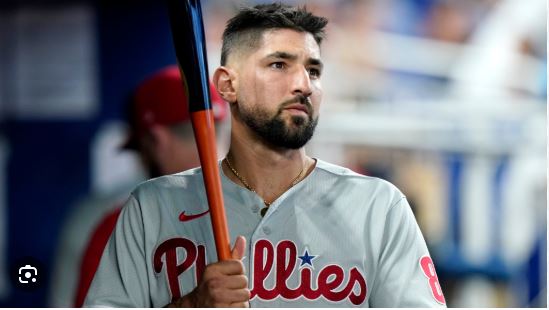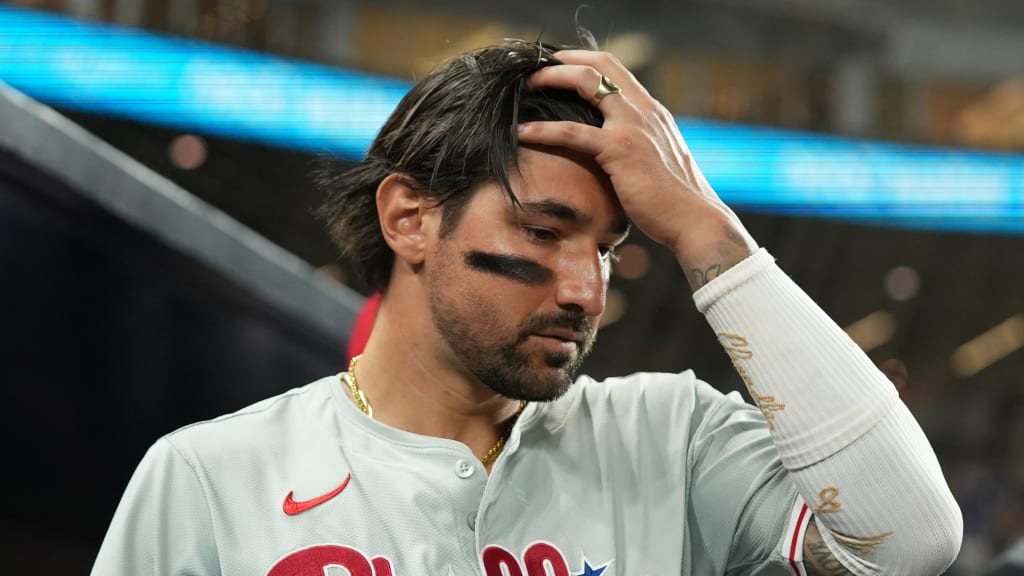
-Setting the Stage: The Rising Tension Between Thomson & Castellanos
For much of Nick Castellanos’s tenure in Philadelphia, he’s been a reliable producer — a veteran bat in the lineup, a consistent presence, a guy the team could count on. But the 2025 season has seen cracks emerge in that relationship.
* Castellanos has publicly questioned the level of communication from the manager:
> “There’s just been times where things have been said … and actions would be different.” ([Inquirer.com][1])
* Thomson, for his part, acknowledged the criticism:
> “If not only Nick, but if anybody in that clubhouse doesn’t think that I’m communicating enough … I’ve got to do a better job.” ([Inquirer.com][2])
* This friction has been compounded as the Phillies have shifted to more of an outfield rotation/platoon approach, reducing Castellanos’s everyday role. ([Inquirer.com][3])
So when Thomson made a direct announcement about benching or limiting Castellanos, it wasn’t coming from a vacuum — it was the culmination of mounting tension.
—
## The “Major Announcement”: Bench Decision & Role Change
What exactly was this “major announcement”?
* In **June 2025**, Thomson sat Castellanos for a game, citing an **“inappropriate comment”** made to the manager after being removed for a defensive replacement late in a game. ([Reuters][4])
* That benching broke Castellanos’s streak of 236 consecutive starts — a durable presence suddenly taken out of the lineup. ([Reuters][4])
* More broadly, Thomson has shifted Castellanos into a **platoon-type role**, starting only against favorable matchups rather than every game. ([Yardbarker][5])
* Thomson’s language has made clear that the decision is performance- and matchup-based:
> “I’m going to put out what I think is the best lineup on any given day to win.” ([Yardbarker][5])
In short: the manager has publicly demoted Castellanos from a fixture in the lineup to a more situational player.
## Why This Could Sabotage the Phillies’ Playoff Chances
Removing or limiting a veteran hitter like Castellanos mid-season isn’t just a clubhouse headline — it carries tangible risk. Here are the ways this move could (or already did) hurt Philadelphia’s postseason bid:
### 1. Offensive Disruption & Loss of Consistency
Castellanos has brought a veteran bat to the order. Though his 2025 numbers have declined, he still represents offensive depth. By restricting his starts:
* The Phillies lose a seasoned option in late-game situations.
* Role uncertainty can lead to reduced production — players perform better when they know their role.
* It may force Thomson to lean heavier on less-proven or more volatile players in critical spots.
2. Clubhouse Morale & Chemistry
Team dynamics matter more in October than in April. When a veteran perceives being disrespected or undervalued:
* Other players may question how stable their roles are.
* The tension could lead to distractions or fractures in unity.
* Opposing clubs can sense internal discord and exploit it.
Given that Castellanos openly voiced frustration about “questionable communication,” the damage may already extend beyond just his slot in the lineup. ([Inquirer.com][1])
### 3. Poor Postseason Decisions Amplify Mistakes
Even with a reduced role, Thomson’s postseason decisions involving Castellanos have drawn criticism — arguably for good reason:
* In the NLDS, Thomson called for a **Bryson Stott bunt** with Castellanos on second. The Dodgers executed a wheel play perfectly to tag Castellanos out. Many analysts saw that as a needless sacrifice of an out in a high-leverage spot. ([SI][6])
* That play alone might be seen as symbolic of how managerial aggressiveness (or overthinking) compounds the harm of limiting a key bat.
### 4. Depth and Flexibility Are Weakened
Baseball’s postseason often hinges on matchups, substitutions, pinch‑hit opportunities, and defensive replacements. When a manager limits a versatile bat:
* He loses flexibility to counter an opponent’s moves.
* In tight games, you want as many strong options available as possible.
* If other players are injured or underperforming, the bench is weaker.
—
## How Far Has the Damage Already Reached?
It’s not speculative: signs suggest the Phillies are already feeling the effects.
* The bullpen was taxed in close games where additional offensive support could have alleviated pressure; the margin for error narrows when you lose plate depth.
* Castellanos himself is visibly frustrated, openly speaking about communication issues with the manager. ([Inquirer.com][1])
* Some analysts argue that Thomson’s postseason decisions are **hurting** the Phillies — especially in how he’s using (or not using) Castellanos. ([SI][6])
So while the postseason is far from decided, the signs are not encouraging

## Could This Backfire on Rob Thomson (and the Phillies)?
Yes — and perhaps already has:
* If Castellanos regains form in a bench role, the decision to sideline him will look questionable in hindsight.
* If the Phillies stumble in a close series, critics will point to how Thomson mishandled a veteran bat.
* The manager’s credibility is no small thing. If players lose trust in his decision-making or fairness, it affects buy-in across the roster.
—
Rob Thomson’s decision to bench or demote Nick Castellanos is more than a headline — it’s a turning point. A veteran presence is being sidelined, relationships strained, and the margin for error in October has suddenly shrunk. If the Phillies fail to advance, this “major announcement” could very well be seen as the moment their playoff aspirations unraveled.

Leave a Reply